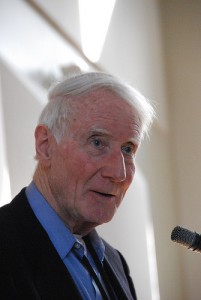
The lavish Morrison Reading Room in Berkeley
I wondered if the room was as lavish as I remembered it. The last time I had been in this reader’s paradise was almost exactly a decade ago, in February 2000. The occasion was Czesław Miłosz‘s poetry reading, and I was scheduled to interview him within a few days of the event. I described it this way in California Monthly this way:
As seats fill up in the wood-paneled Morrison Reading Room of Doe Library, students climb to the mezzanine level, draping themselves between the balustrades like pensive, latter-day gargoyles. Below, journalists and photographers buzz like flies among the crowd, which chatters incessantly. The mood feels more like a gala theater premiere than a noon poetry reading.
In the commotion, no one seems to notice as the star of the day, Czeslaw Milosz, Berkeley’s only Nobel laureate in the humanities, enters. He’s dressed as quietly as his entrance, wearing a dark corduroy jacket with a maroon tie and puckered pocket square. His oxblood satchel contains his poems, computer-printed in oversized type to be easy on the eyes of the 89-year-old Polish poet. He moves slowly and decisively, with a cane. Milosz’s face is softer, paler, rounder than it appears in the photos that have made his face a literary icon, though the trademark bushy eyebrows still give him a slightly forbidding look.

Peter Dale Scott
No one then knew it would be his last reading in Berkeley. Within a few months, he was back in Kraków. While he had been dividing his time between Berkeley and Kraków for some years, health problems had finally stranded him — not unhappily — in Poland for good.
So here I was again, on Friday, May 14, making the nerve-wracking rush-hour trek to Berkeley. This time I was visiting at the invitation of poet Peter Dale Scott — a poet and former Canadian diplomat who was one of Miłosz’s very early translators and friends. He had contributed to my forthcoming book, An Invisible Rope: Portraits of Czesław Miłosz. I had reason to be grateful: he had been a courtly, kindly, and reassuring presence in what was not always a kind process of herding contributors against a deadline gun.
Peter gave UC-Berkeley’s Annual Stronach Lecture. His topic: “Poets Who Grow Gardens in Their Heads: Some Observations on Robert Duncan, Czesław Miłosz, and Judith Stronach.” It was splendid. A few of his comments:
“My intimacy with Milosz reinforced a contrast I had already felt in Warsaw: of the contrast between Poland — a
powerful culture with only a perilously established state – and America – a powerful state with only an incipient and perilously established culture. I may have sensed this the more strongly as a citizen of Canada, where neither state nor culture are particularly strong, and uncertainties — as poets have to be aware — surround the future of both. …
“Thus for Milosz ironic detachment was not enough; the poet has a responsibility to teach. In the same passage he wrote how in the debased conditions of wartime Warsaw people had dreams “about a beautiful future,” and how he gave these dreams expression: ‘Sometimes the world loses its face. It becomes too base. The task of the poet is to restore its face, because otherwise man is lost in doubt and despair. It is an indication that the world need not always be like this, it can be different.’
As he wrote much later in Berkeley, ‘what is needed in misfortune is a little order and beauty.’” …
“In his later years Milosz returned to his theme that poets should enliven hope. Thus he criticized modern poetry, starting with Mallarmé, for its “increasing irrationality” and “disappearance of logically deducible meaning.” In his Nobel Laureate lecture, he contrasted the irrelevancy of “autonomous” poetry with the power, even the danger, of poetry “in search of reality”
(or what Duncan called “the truth of things”):
‘There is, it seems, a hidden link between theories of literature as Écriture, of speech feeding on itself, and the growth of the totalitarian state. In any case, there is no reason why the state should not tolerate an activity that consists of creating “experimental” poems and prose, if these are conceived as autonomous systems of reference, enclosed within their own boundaries. Only if we assume that a poet constantly strives to liberate himself from borrowed styles in search for reality, is he dangerous. In a room where people unanimously maintain a conspiracy of silence, one word of truth sounds like a pistol shot.'”
And yes, the wood-paneled room — with its marble busts of Dante, Goethe, some Greek or other and a Roman or two — was as lavish as I remembered it. So was the reception afterwards, where I had a chance to chat with Chana Bloch. (By the by, I wrote about Milosz and Robert Hass‘s joint appearance at Stanford here.)
Tags: Czeslaw Milosz


May 21st, 2010 at 1:09 pm
The mezzanine is a delightful place to read for pleasure. As a student in the 60s I was told I could not bring home work into the Morrison Room, it was only for reading for enjoyment.
May 22nd, 2010 at 12:13 pm
How funny! How do they determine who is enjoying what they read?
May 24th, 2010 at 12:37 pm
There’s a wonderful series of poetry readings — the Lunch Poets — the 1st Thursday of the month in the Morrison Room, and lots of other literary events. As your photo reveals, the room is sumptuous and warm.
December 9th, 2011 at 8:33 am
Oh Stanfurd. This article says nothing about the Morrison reading room being haunted, literally or metaphorically.
December 9th, 2011 at 8:40 am
Poetic license.